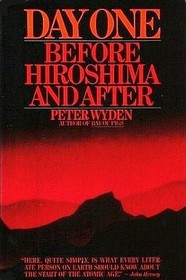Disturbing, but important look at events surrounding the atomic bomb.
From Amazon Reviews: November 30, 2005
By Montaigne "markomundo" (Glen Ridge, NJ United States):
The idyllic glow following the end of the Cold War has diminished and a new reality is gripping the world. The underlying issue of course is still the Bomb. This weapon of mass destruction still holds a central place in our fears, casting a dark shadow on the human condition. Peter Wyden's Day One: Before Hiroshima and After does a fine job of discussing a pivotal day in history, the day the United States dropped a weapon of mass destruction on Japan.
The actors in this atomic drama are at times entertaining and at other times frightening. J. Robert Oppenheimer comes across as a scientist of enormous complexity. Gen. Leslie Groves kept the Manhattan Project on track, building the first operational atomic bomb in a few years. President Harry Truman ultimately authorized its use against targets in Japan. He claimed to have no regrets about doing so. Wyden manages to convey some of the moral and ethical angst the actors were experiencing throughout the project. Many of the scientists involved in the Project had serious moral qualms about the Bomb. These misgivings were often overshadowed by the force of stronger personalities in the political and scientific communities, including Oppenheimer and Edward Teller. Numerous alternative scenarios are discussed by the actors, including a demonstration of the Bomb for Japan and the world community. Alternative considerations were ultimately dismissed because the principals had already made up their minds.
Wyden devotes much of the second half of the book to the Bomb's horrific effects on the Japanese. Though he does not come right out and say so, one gets the sense that the author believes the Bomb should not have been used. Certainly the decision to use the Bomb has been debated for over 60 years and arguments have been made on both sides. What this book provides the reader with an understanding of the historical process of building the Bomb, the arguments for and against its use by the people involved in the decision making process, and finally the importance of the Bomb in dividing history into Before and After. Wyden has written a thought-provoking book that is worth reading.
From Amazon Reviews: November 30, 2005
By Montaigne "markomundo" (Glen Ridge, NJ United States):
The idyllic glow following the end of the Cold War has diminished and a new reality is gripping the world. The underlying issue of course is still the Bomb. This weapon of mass destruction still holds a central place in our fears, casting a dark shadow on the human condition. Peter Wyden's Day One: Before Hiroshima and After does a fine job of discussing a pivotal day in history, the day the United States dropped a weapon of mass destruction on Japan.
The actors in this atomic drama are at times entertaining and at other times frightening. J. Robert Oppenheimer comes across as a scientist of enormous complexity. Gen. Leslie Groves kept the Manhattan Project on track, building the first operational atomic bomb in a few years. President Harry Truman ultimately authorized its use against targets in Japan. He claimed to have no regrets about doing so. Wyden manages to convey some of the moral and ethical angst the actors were experiencing throughout the project. Many of the scientists involved in the Project had serious moral qualms about the Bomb. These misgivings were often overshadowed by the force of stronger personalities in the political and scientific communities, including Oppenheimer and Edward Teller. Numerous alternative scenarios are discussed by the actors, including a demonstration of the Bomb for Japan and the world community. Alternative considerations were ultimately dismissed because the principals had already made up their minds.
Wyden devotes much of the second half of the book to the Bomb's horrific effects on the Japanese. Though he does not come right out and say so, one gets the sense that the author believes the Bomb should not have been used. Certainly the decision to use the Bomb has been debated for over 60 years and arguments have been made on both sides. What this book provides the reader with an understanding of the historical process of building the Bomb, the arguments for and against its use by the people involved in the decision making process, and finally the importance of the Bomb in dividing history into Before and After. Wyden has written a thought-provoking book that is worth reading.





